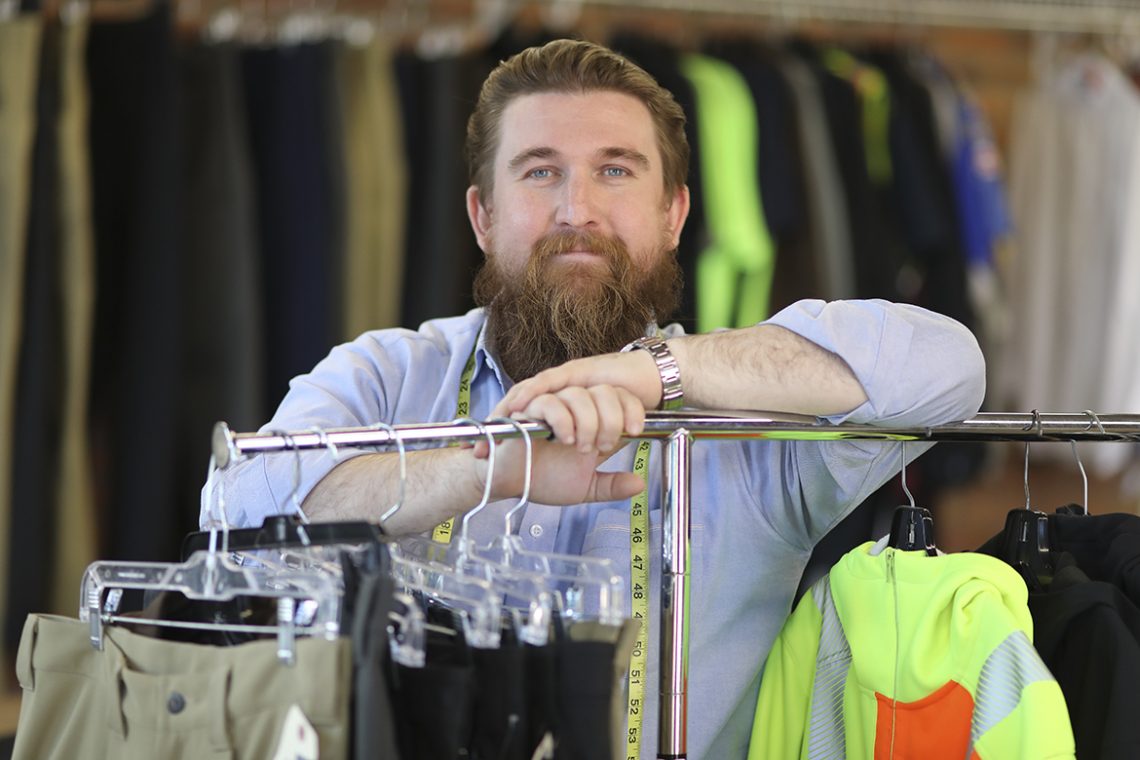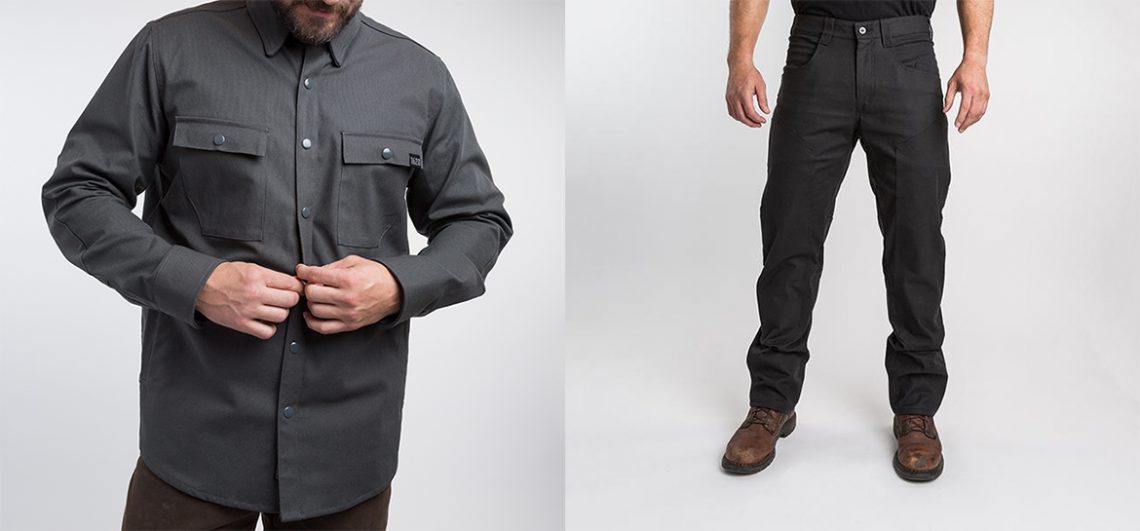With his company, 1620 Workwear Inc., Ted DeInnocentis ’04 produces high-tech, crave-worthy clothing for the modern tradesman in Haverhill, Mass.
By Marc Glass, January 2019
Asked about the genesis for launching 1620 Workwear Inc., Ted DeInnocentis ’04 said he one day came to a provocative realization: Much of the physical work people do — lugging, shoveling, hammering, and sawing — is a real workout.
The problem, says DeInnocentis, is that the clothes people have traditionally worn for those kinds of activities are the last things anyone should wear when working up a sweat.

Ted DeInnocentis ’04, co-founder of 1620 Workwear Inc. says the company name “speaks to the idea of coming back and landing near home, starting anew and creating our own way.” (Photograph by Marc Glass.)
“The workwear market has traditionally offered clothing that’s mostly cotton, or polyester-cotton, which does not perform well. It’s cold when wet, and because it doesn’t stretch you have to offer the clothing in big, oversize cuts just to allow people room to move,” he explains. “This means a person is dragging around pounds of extra fabric that they don’t need. If designers could make workwear in a more ergonomic fit, with a more durable, technical fabric, then you actually wouldn’t need to use all this extra fabric to make the garment functional.”
DeInnocentis is, incidentally, predisposed to think about fabrics, cut, fit, and apparel market share. In the years between earning a degree in business economics at UMF and co-founding 1620 Workwear, he lived in Guangdong Province of mainland China, working for KTC Limited, a maker of premium, technical, and activity-specific apparel for labels like Arc’teryx, Mammut, and Bjørn Dæhlie Nordic Skiwear. The years-long experience was like an unofficial MBA program in apparel manufacturing, complete with experiential learning opportunities in product development, supply-chain management, and pricing estimation.
The volume and stakes were high. “We were making millions of garments a year, and I was in charge of a purchasing department that was handling tens of millions of dollars,” he explains.
But he longed for an operation of his own — back home. So DeInnocentis and his business partner, Josh Walker, explored the possibility of manufacturing workwear in Massachusetts, with textiles used by the U.S. military special forces, the NFL, and rock climbers.
“We looked at fabrics for activities in which failure is not an option and then how to repurpose those fabrics in designs that are beneficial to everyday working people,” he says.
What they came up with is a line of clothing that’s a triumph of form and function — featuring pieces that are durable, comfortable, and stylish, easily segueing the wearer from the work site to a client meeting or a kid’s soccer game. Since DeInnocentis and Walker launched 1620 in June 2017, they have sold thousands of pairs of pants, including the NYCO Double Knee, which made Outside Magazine’s Best Winter Workwear of 2019 list.

Among 1620’s bestseller collection are the Stretch NYCO Shirt Jacket (left) and the Stretch NYCO Double Knee Pant. (Photos courtesy of 1620 Workwear Inc.)
In this installment of the Q&A series “Ask Me Another,” DeInnocentis explains the story and spirit behind the company name, why many tradespeople are inclined to buy 1620’s pricier, technical workwear, and the virtues of manufacturing in Haverhill, Mass.
What about your approach to design and fabrics differentiates 1620 Workwear from traditional work clothing?
“It’s technical from the ground up. We start with an ergonomic design, features, and fit. A lot of injuries on the job site are caused by slipping and fatigue. So by making a pant that is more form fitting, more ergonomic, and has a technical fabric component, we can actually help reduce fatigue.”
Some of the 1620 Workwear pieces cost three or four times as much as the traditional cotton-based offerings. How did you know there would be a market for your clothing — that tradespeople would want to buy premium workwear?
“You have to realize that our customers — contractors, electricians, plumbers, and carpenters — may already be buying ‘best in class” in their truck, their tools, their boots, their sunglasses and in their snowmobiles and their ATVs. In every aspect of their life, they have a good, a better, and a best purchasing option. I know an electrician who has a summer lake house on Lake Winnipesaukee and a carpenter who built himself a half-million dollar house in Rangeley. They will spend $1,000 on a motorcycle jacket or as much on fly-fishing gear. Our clients are successful and are looking for ‘best in class’ in their workwear, too.”
Aside from a more streamlined, ergonomic fit, style seems to be important in 1620 Workwear. Is it important to your customers as well?
“They want something that’s versatile. They don’t want to come off the job site and look like they just came off the job site. If you’re going from a job where you’re actually working or operating heavy equipment and then you have to meet with someone to try to get a $10 million contract, you can’t look like you were just working on your machines. Our clothing has a multipurpose, universal aesthetic.”
Manufacturing clothing in the U.S. seems to be bucking a trend. Why did you choose to make 1620 Workwear in Haverhill?
“1620 is the year that the pilgrims left England and landed on Plymouth Rock. So for my partner and me, the company name speaks to the idea of coming back and landing near home, starting anew and creating our own way. Manufacturing here definitely is a differentiator for us, and as a small business, allows us to be way more nimble and reactive to the market. We make smaller runs, we can actually make a lot more product and different styles, and test the market much easier than if we had to buy large volumes from Asia to test the market. So we’re actually able to be smarter about our business.”
How does manufacturing here allow you to be smarter?
“Being really connected to your manufacturing makes innovation that much easier because everything is at your fingertips. We could have an idea this morning and by tomorrow morning actually have a sample that’s in the field being tested. If you have to wait six to eight weeks for a factory in Asia to make a sample and you get it back and it’s not right, it slows everything down. There’s definitely something to be said for being connected to your manufacturing so you can solve problems on the same day.”
How does it feel to be employing people in manufacturing in your home state?
“Gore-Tex is an American company. Polartec is an American company. Primaloft is an American company. So you have these great American names in textiles, but actually most everything made with these materials is manufactured in Asia. Creating something that creates jobs is a bonus. But we want to be in manufacturing here because we want to be directly connected to our own manufacturing — to eliminate waste in the process of shipping overseas, back and forth, and because we can bring that work in-house and empower ourselves to be more successful.”
Learn more about 1620 Workwear Inc. at www.1620usa.com

